Some book reviews
I have a Goodreads account, but I never know what to do with it. I wish there wasn't always that star rating attached to leaving reviews in places, because it just doesn't fit the way I read a book. I read primarily for fun and escape, because I have enough real life stress to deal with, thanks! And I can not "like" a book in a fun, escapist sort of way, but still find it valuable reading. Being on the writer side complicates things, too--sometimes I like a book even if the author is prickly in real life. Sometimes I think the world of the author, but what if I don't connect with their book? I could do this easier back when authors were mysterious benefactors of stories, but now that they are real people...yeah.
Anyway, here are some books I've read so far this year that I liked in some way or another.
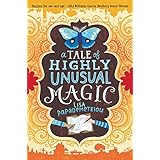
A Tale of Highly Unusual Magic, by Lisa Papademetriou. A really great middle grade read-aloud. It’s about two supposedly unconnected girls who each go away for the summer to visit family members, and each find a blank book called The Exquisite Corpse. They write in it, and the book writes back. (Well, really, they’re writing back to each other, but they don’t realize that.) One girl is in Texas and one is in Pakistan. And there’s a funeral home. And there is justice for past wrongs, too. And they are all connected.
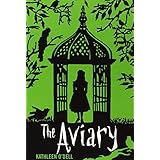
The Aviary, by Kathleen O’Dell. Middle grade. It reminded me of a book by Sarah Williams. Turn of the century-ish, about a girl named Clara who lives with her mother, the cook, and old Mrs. Glendoveer, who her mother is taking care of. Oh, and five birds who have lived far past their ordinary lifespan. When Mrs. Glendoveer dies, Clara secretly makes a friend, Daphne, and they discover the scandal that happened before. Mr. Glendoveer was a professional magician, only then his kids were kidnapped and drowned. One child, Elliott, the youngest, disappeared. The birds start to talk, and it’s up to the kids to find out what really happened, where to find Elliott, and how to bring the criminals to justice.
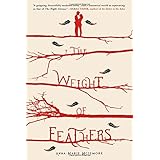
The Weight of Feathers, by Anne-Marie McLemore. Interesting Romeo and Juliet retelling. The Cobeau family are a traveling performing family. They wear feathered wings and do an act in the trees. The Paloma family is a traveling performing family. They have a mermaid act. The two families haaaaaate each other, each blaming the other for destroying some family members and their performing location in this one place they always end up at every year. The night the local factory blows, letting loose hazardous chemical rain that can kill people, Luc “Cluck” Corbeau saves the life of Lace Paloma. They don’t know who each other are. But the mark of his feather (yes, they grow feathers under their hair) ends up on her arm. Burned and unable to be in the mermaid act, so goes to the Corbeaus under cover, hoping to even up the score so that the curse of the feather mark can be lifted. But of course, they fall for each other-the rejected ones in each of their clans. (Luc’s mother has never loved him, and his brother regular beats him up.) As they learn the truth about what really happened at the factory long ago, and more importantly, what really happened between the two families, they find the strength to become who they really are.
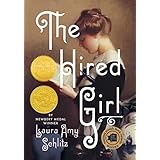
The Hired Girl, by Laura Amy Schlitz. About a girl in 1911 (Joan Skraggs, only she prefers to be called Janet Lovelace) who runs away from an abusive farm family at age 14 and becomes a hired girl for a Jewish family in Baltimore. She pretends to be 18 but is of course very young, so she makes a lot of embarrassing mistakes, like falling for the charming 21 (!) YO son of the family, and also plenty of religious clashes (she didn’t know much about Jews and she was trying to become confirmed Catholic). Won the youth category of I think the National Book Award. Very well written. Some outcry because of a couple lines showing her ignorance about Native Americans (but that was the POINT-that she was young and naïve).
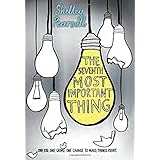
The Seventh Most Important Thing, by Shelley Pearsall. This was a good one. Maybe fans of Gary Schmidt might like it. I didn’t realize it was based on a true person’s life until I read the afterword, either (which is a good thing-sometimes when you try to novelize something real, it doesn’t feel organic. I read another book recently that didn't quite work for that reason). It’s about a kid named Arthur who is mourning the death of his dad, and in his grief, throws a brick at the Junk Man and breaks his arm. He gets sentenced to helping the Junk Man with his work--which is, indeed, going through garbage cans looking for certain things. At first it's pretty mortifying, but then Arthur starts to understand what exactly the old guy is doing. I loved reading about the transformative power of art and how learning to recognize it changed this kid and his attitude towards other people.
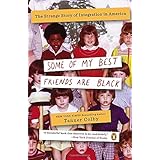
Some of My Best Friends are Black: The Strange Story of Integration in America, by Tanner Colby. Adult nonfiction about racism, why it is still around, and what keeps it going. This was a good one. I don’t know that it offers solutions, but it does a great job of pointing out a lot of less-discussed issues in integration. He covers four areas that seem unrelated, but which really underscore the segregation that still exists in our society: school (why is there still a black table and a white table at some school cafeterias?), housing (creepy history of blockbusting and HOAs), worship (once you force out a group of people, they make their own culture, and don't want to give that up later when people come, wanting to integrate), and work (education is great, but personal mentors and connections in the field are what get people jobs. If you have no one in your group in your industry *cough* publishing *cough* it's hard to break in, no matter what skills you have). It's partly the story of what happens long term when you shut out a certain segment of the population, but it's also about the complicated dance between wanting to have the same opportunities as anyone else, but not letting go and losing your culture.
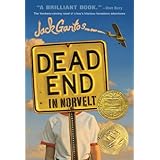
Dead End in Norvelt, by Jack Gantos. MG; I think this won a recent Newbery. Funny and…strange. The main character shares an exact name with the author. I think it’s part fiction and part true. Set in the 60s with a pro-Bernie Sanders mother and a pro-Donald Trump dad (not literally, of course--but if they lived today, they would each be posting for their respective candidates with loud voices on Facebook), Jack is caught in the middle. He gets grounded for the summer and ends up typing obituaries for the crazy old lady down the street. Meanwhile, the town's elderly are dying at a suspiciously alarming rate. Weird book. Great voice.
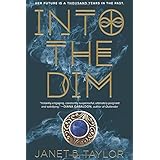
Into the Dim, by Janet B. Taylor. Aaah. This was a fun one. As some have said, it’s a bit reminiscent of Ruby Red (the time travel, the jewels, the conspiracy). But still fun. Hope Walton (author is from Arkansas--yay!) goes to Scotland to visit aunt after mother dies. But Hope doesn’t believe mom is dead, and she’s right-mom is trapped in the middle ages. Mystery and warring factions of time travelers and hot boys, etc. This would be pure escapism when that is what you are looking for!

The Hollow Boy, by Jonathan Stroud. Third in the Lockwood & Co series. Not quite as creepy as the last one (which was SCARY), but still good. Lucy can hear ghosts and wants to listen to them, which is rather dangerous when her team is supposed to be eradicating them before they touch and kill people. Her team is trying to find the center of a massive outbreak. Also, they get a new assistant in this book, Holly Munro. She and Lucy do NOT get along. Lucy is a bit jealous of Lockwood’s attention to Holly… Lockwood is a bit of a privileged dude, even if he’s had hard stuff happen to him. I really like the ghost in the jar. He’s got quite a personality! There's a lot of character growth in here, and some developments that make me want the next book NOW.
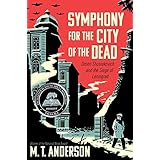
Symphony for the City of the Dead, by MT Anderson. I grew up on classical music, especially all things Slavic, and in high school, our band did one of his pieces in a concert contest. I also wrote a paper for Russian class (in Russian; I have no idea what the words say anymore) on his 10th symphony. So I came in knowing something about him already, but this was a lot more. (Plus, in English, so I could understand!) Really excellent book about Dmitri Shostakovich's heady young days in the revolution, the scary, scary times of Stalin’s purges (what a person has to complain of when it comes to classical music is beyond me-how can violins be “anti-people,” or how can formalism be punishable by death??). The siege of Leningrad, Shostakovich writing his 7th symphony, the horrors of the siege and the turning point of hope when finally the staggering musicians still alive played his symphony in their city. I cried in that chapter.
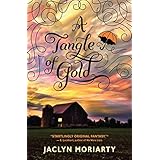
A Tangle of Gold, by Jaclyn Moriarty. Ooh. I love it when the last book still manages to have twists and surprises! This was a great ending to the Colors of Madeleine series. This is such a strange and enjoyable series. The writing feels a bit stream of consciousness, but then you wake up and realize that all of it is real. There are spoilers I can't talk about! But it's about of course resolving the plot problems of Worldians and Cellians, and also a bit about people meaning well and messing up (or meaning ill and changing). Very, very enjoyable book!
Anyway, here are some books I've read so far this year that I liked in some way or another.

A Tale of Highly Unusual Magic, by Lisa Papademetriou. A really great middle grade read-aloud. It’s about two supposedly unconnected girls who each go away for the summer to visit family members, and each find a blank book called The Exquisite Corpse. They write in it, and the book writes back. (Well, really, they’re writing back to each other, but they don’t realize that.) One girl is in Texas and one is in Pakistan. And there’s a funeral home. And there is justice for past wrongs, too. And they are all connected.

The Aviary, by Kathleen O’Dell. Middle grade. It reminded me of a book by Sarah Williams. Turn of the century-ish, about a girl named Clara who lives with her mother, the cook, and old Mrs. Glendoveer, who her mother is taking care of. Oh, and five birds who have lived far past their ordinary lifespan. When Mrs. Glendoveer dies, Clara secretly makes a friend, Daphne, and they discover the scandal that happened before. Mr. Glendoveer was a professional magician, only then his kids were kidnapped and drowned. One child, Elliott, the youngest, disappeared. The birds start to talk, and it’s up to the kids to find out what really happened, where to find Elliott, and how to bring the criminals to justice.

The Weight of Feathers, by Anne-Marie McLemore. Interesting Romeo and Juliet retelling. The Cobeau family are a traveling performing family. They wear feathered wings and do an act in the trees. The Paloma family is a traveling performing family. They have a mermaid act. The two families haaaaaate each other, each blaming the other for destroying some family members and their performing location in this one place they always end up at every year. The night the local factory blows, letting loose hazardous chemical rain that can kill people, Luc “Cluck” Corbeau saves the life of Lace Paloma. They don’t know who each other are. But the mark of his feather (yes, they grow feathers under their hair) ends up on her arm. Burned and unable to be in the mermaid act, so goes to the Corbeaus under cover, hoping to even up the score so that the curse of the feather mark can be lifted. But of course, they fall for each other-the rejected ones in each of their clans. (Luc’s mother has never loved him, and his brother regular beats him up.) As they learn the truth about what really happened at the factory long ago, and more importantly, what really happened between the two families, they find the strength to become who they really are.

The Hired Girl, by Laura Amy Schlitz. About a girl in 1911 (Joan Skraggs, only she prefers to be called Janet Lovelace) who runs away from an abusive farm family at age 14 and becomes a hired girl for a Jewish family in Baltimore. She pretends to be 18 but is of course very young, so she makes a lot of embarrassing mistakes, like falling for the charming 21 (!) YO son of the family, and also plenty of religious clashes (she didn’t know much about Jews and she was trying to become confirmed Catholic). Won the youth category of I think the National Book Award. Very well written. Some outcry because of a couple lines showing her ignorance about Native Americans (but that was the POINT-that she was young and naïve).

The Seventh Most Important Thing, by Shelley Pearsall. This was a good one. Maybe fans of Gary Schmidt might like it. I didn’t realize it was based on a true person’s life until I read the afterword, either (which is a good thing-sometimes when you try to novelize something real, it doesn’t feel organic. I read another book recently that didn't quite work for that reason). It’s about a kid named Arthur who is mourning the death of his dad, and in his grief, throws a brick at the Junk Man and breaks his arm. He gets sentenced to helping the Junk Man with his work--which is, indeed, going through garbage cans looking for certain things. At first it's pretty mortifying, but then Arthur starts to understand what exactly the old guy is doing. I loved reading about the transformative power of art and how learning to recognize it changed this kid and his attitude towards other people.

Some of My Best Friends are Black: The Strange Story of Integration in America, by Tanner Colby. Adult nonfiction about racism, why it is still around, and what keeps it going. This was a good one. I don’t know that it offers solutions, but it does a great job of pointing out a lot of less-discussed issues in integration. He covers four areas that seem unrelated, but which really underscore the segregation that still exists in our society: school (why is there still a black table and a white table at some school cafeterias?), housing (creepy history of blockbusting and HOAs), worship (once you force out a group of people, they make their own culture, and don't want to give that up later when people come, wanting to integrate), and work (education is great, but personal mentors and connections in the field are what get people jobs. If you have no one in your group in your industry *cough* publishing *cough* it's hard to break in, no matter what skills you have). It's partly the story of what happens long term when you shut out a certain segment of the population, but it's also about the complicated dance between wanting to have the same opportunities as anyone else, but not letting go and losing your culture.

Dead End in Norvelt, by Jack Gantos. MG; I think this won a recent Newbery. Funny and…strange. The main character shares an exact name with the author. I think it’s part fiction and part true. Set in the 60s with a pro-Bernie Sanders mother and a pro-Donald Trump dad (not literally, of course--but if they lived today, they would each be posting for their respective candidates with loud voices on Facebook), Jack is caught in the middle. He gets grounded for the summer and ends up typing obituaries for the crazy old lady down the street. Meanwhile, the town's elderly are dying at a suspiciously alarming rate. Weird book. Great voice.

Into the Dim, by Janet B. Taylor. Aaah. This was a fun one. As some have said, it’s a bit reminiscent of Ruby Red (the time travel, the jewels, the conspiracy). But still fun. Hope Walton (author is from Arkansas--yay!) goes to Scotland to visit aunt after mother dies. But Hope doesn’t believe mom is dead, and she’s right-mom is trapped in the middle ages. Mystery and warring factions of time travelers and hot boys, etc. This would be pure escapism when that is what you are looking for!

The Hollow Boy, by Jonathan Stroud. Third in the Lockwood & Co series. Not quite as creepy as the last one (which was SCARY), but still good. Lucy can hear ghosts and wants to listen to them, which is rather dangerous when her team is supposed to be eradicating them before they touch and kill people. Her team is trying to find the center of a massive outbreak. Also, they get a new assistant in this book, Holly Munro. She and Lucy do NOT get along. Lucy is a bit jealous of Lockwood’s attention to Holly… Lockwood is a bit of a privileged dude, even if he’s had hard stuff happen to him. I really like the ghost in the jar. He’s got quite a personality! There's a lot of character growth in here, and some developments that make me want the next book NOW.

Symphony for the City of the Dead, by MT Anderson. I grew up on classical music, especially all things Slavic, and in high school, our band did one of his pieces in a concert contest. I also wrote a paper for Russian class (in Russian; I have no idea what the words say anymore) on his 10th symphony. So I came in knowing something about him already, but this was a lot more. (Plus, in English, so I could understand!) Really excellent book about Dmitri Shostakovich's heady young days in the revolution, the scary, scary times of Stalin’s purges (what a person has to complain of when it comes to classical music is beyond me-how can violins be “anti-people,” or how can formalism be punishable by death??). The siege of Leningrad, Shostakovich writing his 7th symphony, the horrors of the siege and the turning point of hope when finally the staggering musicians still alive played his symphony in their city. I cried in that chapter.

A Tangle of Gold, by Jaclyn Moriarty. Ooh. I love it when the last book still manages to have twists and surprises! This was a great ending to the Colors of Madeleine series. This is such a strange and enjoyable series. The writing feels a bit stream of consciousness, but then you wake up and realize that all of it is real. There are spoilers I can't talk about! But it's about of course resolving the plot problems of Worldians and Cellians, and also a bit about people meaning well and messing up (or meaning ill and changing). Very, very enjoyable book!